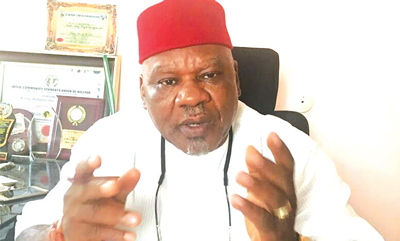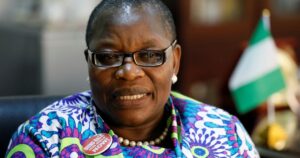Chief Willy Ezugwu was the Secretary General of the Conference of Nigeria Political Parties (CNPP), a civil society leader in Nigeria. In this interview, he speaks on the ongoing nationwide protest, the South East Development Commission (SEDC), local government autonomy and the renewed call for the release of the detained leader of the Indigenous People of Biafra (IPOB), Nnamdi Kanu, among others.
In one of the press conferences, you spoke on the release of Nnamdi Kanu as a measure to curb insecurity in the South East…?
Yes, it’s key to curbing insecurity in the South East. Those who don’t understand what is happening or those who want to play politics with the situation may say that releasing Nnamdi Kanu as a measure to curb insecurity in the South East is a complex issue. But Kanu’s release will help reduce tensions and emotions in the region, as his detention has been a rallying point for common criminals claiming to be speaking for the IPOB and fighting for his release. On the other hand, it will open doors for genuine dialogue and negotiations between the government and IPOB leaders, which could lead to a peaceful resolution of grievances and a reduction of violence and militant activities in the region. He may be able to lead his genuine followers to engage in peaceful discussions with leaders in the region. With the establishment of the South East Development Commission, I would want to believe that the underlying issues driving insecurity in the South East, like poverty, unemployment, and cry of marginalization. So, keeping him in detention after the court ruled against his rendition has emboldened criminals pretending to be fighting for his freedom in the South East region.
What is your advice concerning the national protest?
Well, I think the government should try to see what can be done about the underlying issues fueling the protest and deal with them. In as much as the citizens have the right to protest as a way of expressing their grievances against the government, the protesters must not be violent and avoid the destruction of public infrastructure or things like that. Dialogue is key to resolving grievances and I can only say that anyone who wants to protest should be peaceful and lawful, avoiding violence.
How do you address the issue of hardship in Nigeria?
Hardship in Nigeria is real. I will not lie to you. People are suffering in this and we need leaders to be alive to their responsibility, Mr President and his cabinet need to do more. The same call is going to the state and local government areas; all hands must be on deck to reduce the suffering of the masses in almost all parts of the country.
Do you think the traditional stool can still be of good use in fostering Democracy in Nigeria?
Yes; of course, the traditional institution can still be of good use in fostering democracy in Nigeria and that’s why there has been agitation for constitutional roles for traditional leaders. The traditional stools and leaders have played important roles in the society for years. They have continued to be of influence and are respected. For example, when you think of their cultural relevance, the traditional stools are well rooted in Nigerian culture and are more accessible and within reach to ordinary citizens than today’s democratic institutions because they are closer to the people. Traditional leaders live among the masses. So, a constitutional role will legalise their roles in a democracy.
Also, when you think of grassroots engagement, traditional leaders can mobilize citizens at the grassroots level, promoting participation and engagement in democratic processes. We see it every day. The traditional stool is known to play a role in resolving conflicts. I know how many cases awaiting my intervention in the village right now. So, traditional leaders have over the years played a role in resolving conflicts and disputes within their domains. And because they know the people in their communities, their skills in settling cases can be a way to promote peaceful democratic processes. Don’t forget that the traditional stool can play an advisory role that can guide elected officials, drawing on their experience and knowledge of local customs and traditions. Even with the insecurity in some parts of the country, the traditional stools can play a major role if given the constitutional powers they deserve.
As a former Leader of the CNPP, how do you see the gale of internal crises among political parties today?
It is part of politics; it is all about interests but when the issues go beyond what is best for the society, and become selfish interests, just like there are many other factors. This is because of power struggles and competition for leadership positions and control within the party. But most of the time, it is not based on conflicting views on policy and direction. It is usually about individual interests clashing with party goals or based on tensions along ethnic, regional, or religious lines. However, it is happening because of the years of lack of internal democracy which results most of the time from imposition of candidates. And if not that most of our politicians are selfish, internal political party crisis will be minimal. So, these crises have led to party splits, defections, and loss of public trust, which is affecting the party’s ability to function effectively.
Let’s assess the performances of the 10th Assembly under the Leadership of Sen. Akpobio…?
The President of the Senate is doing his best but more is expected from him. The National Assembly should show empathy and work for the ordinary people of this country. How long will we live on earth? And how much money do we need in our lifetime? The only legacy we will leave behind when we are gone is how much impact we made in the lives of the masses.
Can you comment on the recent utterances of Bayo Onanuga to Peter Obi regarding the rumoured National protest?
It was unfortunate and if I were the President I would have sacked him to show the people that I didn’t authorise him to make such an allegation. Is he saying that the only people suffering from the current economic hardship are Peter Obi supporters? If it is so, then he is telling us that too many people are supporting Peter Obi because the suffering masses are uncountable across the country and political or religious divides. The government should address the concerns of suffering Nigerians and reduce the impact of the economic hardship. Many Nigerians are hungry and jobless and Mr President should know that. The President may be trying but the Nigerian masses demand more from him. We live with them in our communities and we know the extent of the suffering in the land.
How do you see the government’s plea as a solution to end protest and hardship?
The government has done what any government should have done. I hope that the people can endure the hardship more to allow the President to implement his policies.
Is the N70,000 minimum wage commensurate with the economic realities?
Well, it is better than N30,000 minimum wage but it cannot buy a bag of rice today. But I will leave it for the workers to decide if it is commensurate with economic realities but from the feelers we get, it is not. What the government can do now is to bring down the cost of living. Prices of foodstuff and other basic commodities are too high and out of reach of the average worker in Nigeria.
Are you among those calling on Igbos across Nigeria to boycott the rumoured National Protest and why?
Yes, Igbos should stay away from the protest because they are the ones suffering from marginalisation, since the APC government came in 2015, and nobody cared. So, the Igbos are used to suffering and have only survived by God’s grace and hard work. Igbos are not lazy and will always survive. If Igbos survived the civil war and the marginalisation of the South East region since 1999, they will overcome the current hardship in Nigeria.
With a plethora of issues bothering inflation, and insecurity, what is your feeling about the choice of leadership in 2027?
2027 is still far away. We should not be talking about the choice of leadership by the people. The people have always made their choice but forces within and outside INEC will not allow their choices to stand. The best legacy any President can leave is a free, fair, and credible election. See Goodluck Jonathan how he is being celebrated across the world for not interfering with the outcome of the 2015 general elections.
How do you receive Tinubu’s signing into law South East Development Commission (SEDC)?
It is a welcome development and hopefully, it will address the years of absence of federal presence in the South East. I hope that the commission will be adequately funded to be able to change the narrative in the South East and give the people of the zone a sense of belonging to reduce the ongoing agitations in the geopolitical zone.










More Stories
Amaechi working hand in glove with Atiku to unseat Tinubu, says Rivers APC led by Okocha
If Tinubu gives me a job, I’ll reject it because I don’t trust him anymore – APC chieftain Onokpasa
African leaders plundering the continent are often celebrated in the West as reformers, says Yasin Kakande